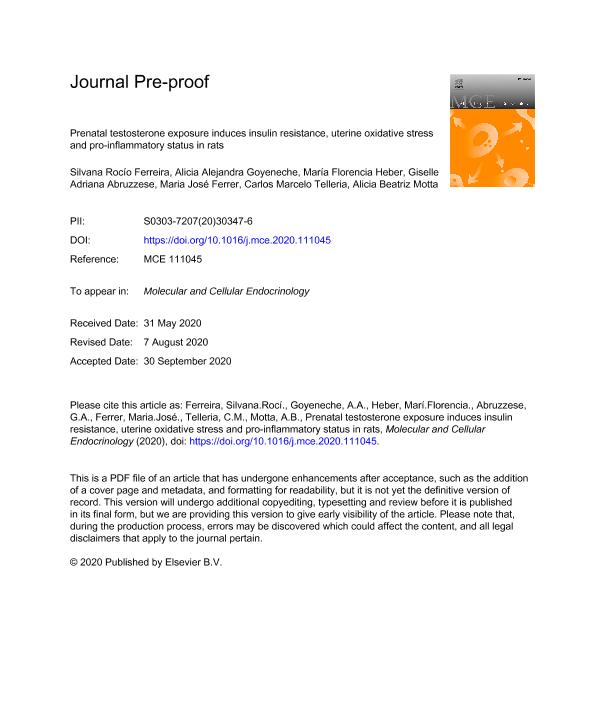Artículo
Prenatal testosterone exposure induces insulin resistance, uterine oxidative stress and pro-inflammatory status in rats
Ferreira, Silvana Rocio ; Goyeneche, Alicia Alejandra; Heber, María Florencia
; Goyeneche, Alicia Alejandra; Heber, María Florencia ; Abruzzese, Giselle Adriana
; Abruzzese, Giselle Adriana ; Ferrer, María José; Telleria, Carlos Marcelo; Motta, Alicia Beatriz
; Ferrer, María José; Telleria, Carlos Marcelo; Motta, Alicia Beatriz
 ; Goyeneche, Alicia Alejandra; Heber, María Florencia
; Goyeneche, Alicia Alejandra; Heber, María Florencia ; Abruzzese, Giselle Adriana
; Abruzzese, Giselle Adriana ; Ferrer, María José; Telleria, Carlos Marcelo; Motta, Alicia Beatriz
; Ferrer, María José; Telleria, Carlos Marcelo; Motta, Alicia Beatriz
Fecha de publicación:
01/2020
Editorial:
Elsevier Ireland
Revista:
Molecular and Cellular Endocrinology
ISSN:
0303-7207
Idioma:
Inglés
Tipo de recurso:
Artículo publicado
Clasificación temática:
Resumen
Prenatal androgen excess is considered one of the main causes of the development of polycystic ovary syndrome. In this study, we investigated the effect of prenatal hyperandrogenization (PH) on the physiology of the adult uterine tissue using a murine model of fetal programming caused by androgen excess in adult female rats. Pregnant rats were hyperandrogenized with testosterone and female offspring were studied when adult. Our results showed that PH leads to hyperglycemia and hyperinsulinemia. Consequently, PH developed insulin resistance and a systemic inflammatory state reflected by increased C-reactive protein. In the uterine tissue, levels of PPAR gamma—an important metabolic sensor in the endometrium—were found to be impaired. Moreover, PH induced a pro-inflammatory and an unbalanced oxidative state in the uterus reflected by increased COX-2, lipid peroxidation, and NF-κB. In summary, our results revealed that PH leads to a compromised metabolic state likely consequence of fetal reprogramming.
Archivos asociados
Licencia
Identificadores
Colecciones
Articulos(CEFYBO)
Articulos de CENTRO DE ESTUDIOS FARMACOLOGICOS Y BOTANICOS
Articulos de CENTRO DE ESTUDIOS FARMACOLOGICOS Y BOTANICOS
Citación
Ferreira, Silvana Rocio; Goyeneche, Alicia Alejandra; Heber, María Florencia; Abruzzese, Giselle Adriana; Ferrer, María José; et al.; Prenatal testosterone exposure induces insulin resistance, uterine oxidative stress and pro-inflammatory status in rats; Elsevier Ireland; Molecular and Cellular Endocrinology; 519; 1-2020; 1-29
Compartir
Altmétricas



